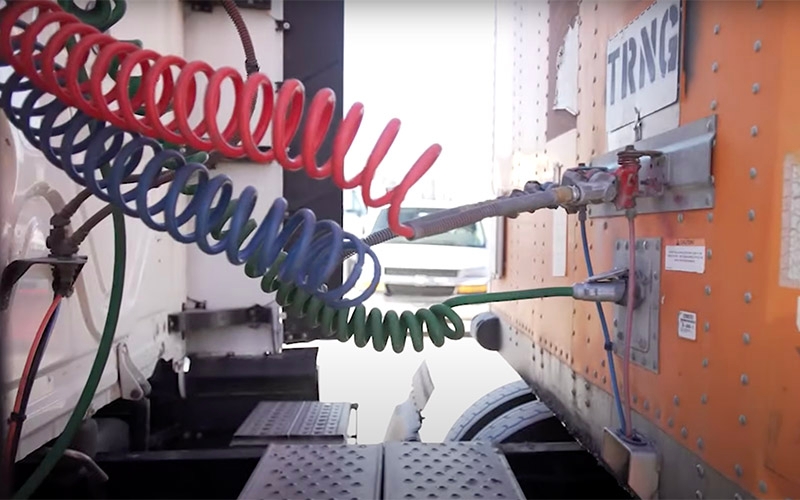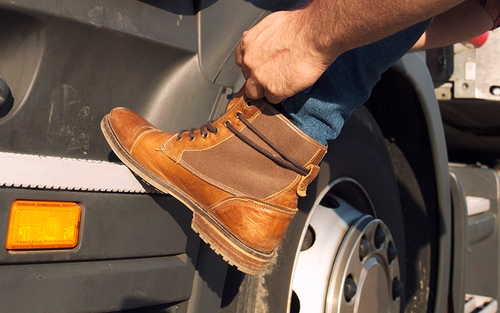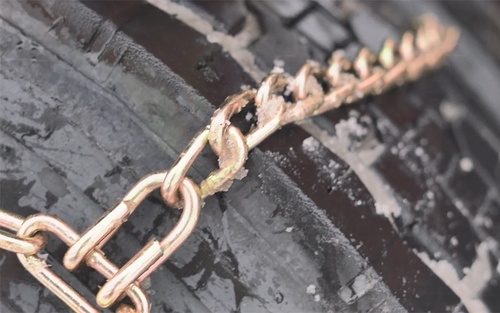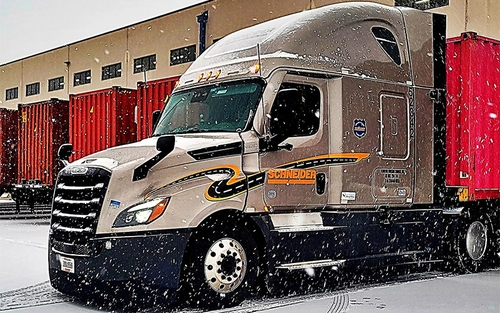How to release frozen air brakes on a semi-truck


By The Schneider Guy
Estimated reading time: 4 minutes
As temperatures continue to drop, truck drivers must be prepared for one of winter’s biggest inconveniences: frozen air brakes. While it is bound to happen in colder parts of the country, there are still some precautions you can take.
Here is what you need to know about how to release frozen air brakes this winter and what steps you can take to prevent them from freezing.
Why air brakes freeze
The two most common causes of frozen air brakes are:
1. Air brake lines freezing.
Since braking systems work by compressing air, it’s an inevitable side effect that moisture will build up in the lines.
If this build-up in the lines remains in cold, overnight conditions, you will be stuck with frozen air brake lines. This ice will then block air from reaching the brake mechanism and cause the wheels to lock up.
2. Brake shoes freezing to the drum.
Due to the nature of winter conditions, your brakes shoes and drums will likely get very wet on the road.
If the brakes are set overnight while wet, they will likely freeze together by morning. You can tell this is the issue if you notice that one (or more) wheels are not spinning.
How to fix frozen air brakes
If your brakes do freeze, there are several ways you can try to fix them.
1. Cut and resupply the air supply.
One of the safest methods to fix frozen air brakes is to cut and resupply air to the trailer. By doing this a few times, you may be able to create enough pressure to break the ice between the drum and the shoe.
You can do this by:
- Pulling the trailer parking brake button out.
- Waiting 10-15 seconds then pushing it back in.
- Waiting another 10-15 seconds to see if it worked.
If this doesn’t work, continue for 10 cycles before calling your leader for help.
2. Rock the trailer.
Depending on how stuck your brakes are, you may be able to jar them loose by simply rocking the trailer back and forth gently. Do not drag your tires, though, as it could seriously harm the equipment.
3. Break them free with a hammer.
Another common option is to simply take a hammer to the brakes to separate the drum and shoe. Make sure to not hit the brake pad, as it could fracture very easily.
You can do this by:
- Supplying the trailer with air.
- Tapping the top and bottom of the brake drum until it loosens. There should be a change in the sound of contact when the brakes are unstuck.
Some safety tips for using this method include:
- Remember to set your tractor brakes.
- Shut off the truck and put the key in your pocket.
- Chock your wheels.
- Do this on an even surface, as the trailer may roll when the brakes are released.
- Never be in the path of the tires when hitting the brakes.
4. Let them thaw in a warm setting.
This is the surest and safest option, but unfortunately not the most practical.
Letting them thaw in a warm setting will allow for ice on the brakes or in the valves/lines to naturally defrost and release your brakes.
How to prevent frozen air brakes
The best way to prevent frozen air brakes is to take the proper precautions before stopping. If you aren't able to park in a warm location when you stop, three things you can do to try to prevent frozen air brakes are:
1. Drain your air tanks.
Draining your air tanks will remove the moisture that accumulates and help lower the risk of them eventually freezing. It is best to do this daily, as moisture building up in the tank and lines is likely in the winter.
Though newer trucks have automatic drain valves, it is still essential to routinely inspect them during periods of cold weather.
2. Check your air dryer.
Routinely check the status of your air dryer by noting the amount of water released when you drain your tanks. If a lot of water comes out, your air dryer may not be functioning properly.
If this is the case, there are two things you can do:
- Replace your air filter: These are often replaced once a year, but it can vary depending on the manufacturer. A lot of drivers replace their filters in the fall, right as the temperature starts to drop.
- Check your air lines and valves: If the filter isn’t the issue, look for any damage to the air lines and valves. These should be checked and serviced around twice a year.
Having a working air dryer does not mean you can skip the step of draining your tanks. Whereas draining the tanks gets rid of existing water in the system, the air dryer works to remove the moisture that is still in the air.
3. Gently rock the trailer.
You can also try to prevent frozen air brakes by gently rocking your trailer back and forth before stopping. By doing this, you can get rid of some of the moisture in the lines and shake water or snow off your brakes.
Please note these are examples of how to release froze air brakes. It is important to remember the type of driver you are, the company you work for and the type of truck you drive can impact how you release frozen air brakes. Be sure to consult your company guidelines or speak with your leader for more information about releasing frozen air brakes.
Are you prepared for winter driving?
Winter weather poses a challenge for even the most experienced drivers. Prepare yourself for difficult road conditions this year by brushing up on our essential tips for winter driving.

Schneider Guy loves the "Big Orange." He's passionate about the trucking industry and connecting people to rewarding careers within it. He's been the eyes and ears of our company since our founding in 1935, and he's excited to interact with prospective and current Schneider associates through "A Slice of Orange."



